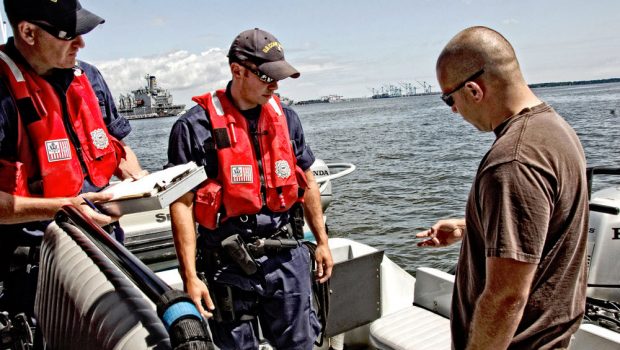Legalized Marijuana and Boating
Published on April 13th, 2017
Just because you’re boating in a state with legalized marijuana doesn’t mean you can bring it on board. Capt. Vincent Daniello details the situation for BoatingMag.com.
With possession of small amounts of marijuana now legal in eight states, boaters are asking whether the U.S. Coast Guard, a federal agency, will abide by those state laws.
The answer is a resounding no.
In six coastal states where marijuana possession is legal, “It remains a violation of federal law. If we encounter it in the course of our operations, we will enforce those laws,” says Lt. Cmdr. Devon Brennan, who oversees the U.S. Coast Guard’s counter-narcotics enforcement programs and policies. Understanding that position is critical for boaters concerned about guests bringing it aboard, thinking it is OK.
In most states today, possession of less than an ounce of cannabis garners a citation and a few-hundred-dollar fine, and recreational use is now legal in Alaska, Washington, Oregon, California, Nevada, Colorado, Maine and Massachusetts.
It’s ironic then that significant problems from cannabis aboard boats occur in seven of those eight states where it is legal. (Because it enables commerce between California and Nevada, Lake Tahoe falls under Coast Guard authority. Only Colorado is devoid of Coast Guard presence.)
Brennan points out that the Coast Guard is not unique. Any federal law-enforcement agency follows federal law. The difference is that on land, federal officers aren’t out writing tickets for faulty taillights, but the Coast Guard routinely boards boats, even within state waters, to enforce federal boating-safety laws.
While the Coast Guard inspects for flares or looks in the PFD locker, if they find a baggie with a little weed, it becomes a big problem. In states where laws prohibit marijuana possession, the Coast Guard routinely passes cases to state authorities. But boaters busted within, say, Massachusetts waters, will face federal prosecution.
Federal law covering small quantities of any Schedule I substance, including marijuana, allows fines as high as $5,000. “We don’t specify an amount [of marijuana],” Brennan says. Instead, circumstances are weighed to determine possession versus “intent to distribute.” First-time offenders can expect marijuana-possession fines similar to state levels, as determined by a Coast Guard civil penalty hearing officer. “Fifty pounds [of marijuana] is where we get into trafficking level,” Brennan adds.
That record of a federal narcotics violation carries other consequences too. Anyone holding a U.S. Coast Guard captain’s license, for example, even if they were out boating for fun on the day of the marijuana citation, will have to wait at least a year after conviction to renew that license and also complete a drug rehabilitation program, among other requirements. (The same holds true for state drug-possession violations.)
State boundaries on the water aren’t defined by welcome signs either. Consider New Hampshire’s 13-mile coastline sandwiched between pot-legal Maine and Massachusetts. As of this article’s writing, simple marijuana possession still carries up to a $2,000 fine and a year in jail.
New Hampshire’s decriminalization effort seems as though it will eventually settle at a $500 fine for possession of less than one-quarter ounce, even though Massachusetts’s recreational-use cutoff is 1 ounce and Maine’s is 2.5 ounces.
Operating under the influence of a controlled substance is the paramount concern of all law-enforcement personnel who I interviewed. “Legalization [of marijuana] has driven us to take a hard look at our OUI program,” Brennan says, which now includes oral fluid collection. “A Standardized Field Sobriety Test determines impairment. The oral fluids tell us what that impairment is caused by.”
OUI might cost more than fines and legal fees too. Insurance policies may not be renewed, or possibly even cancelled, after an OUI conviction. “Review the policy and make sure you fully understand its coverages. Contact your agent or insurer and ask questions,” says Scott Croft, vice president of public affairs for BoatU.S.
“Unlike home or auto policies, boat-insurance coverage can vary significantly.”
While laws vary, it’s clear that marijuana aboard can cause trouble for boaters cruising waters patrolled by federal agencies like the U.S. Coast Guard.









 We’ll keep your information safe.
We’ll keep your information safe.